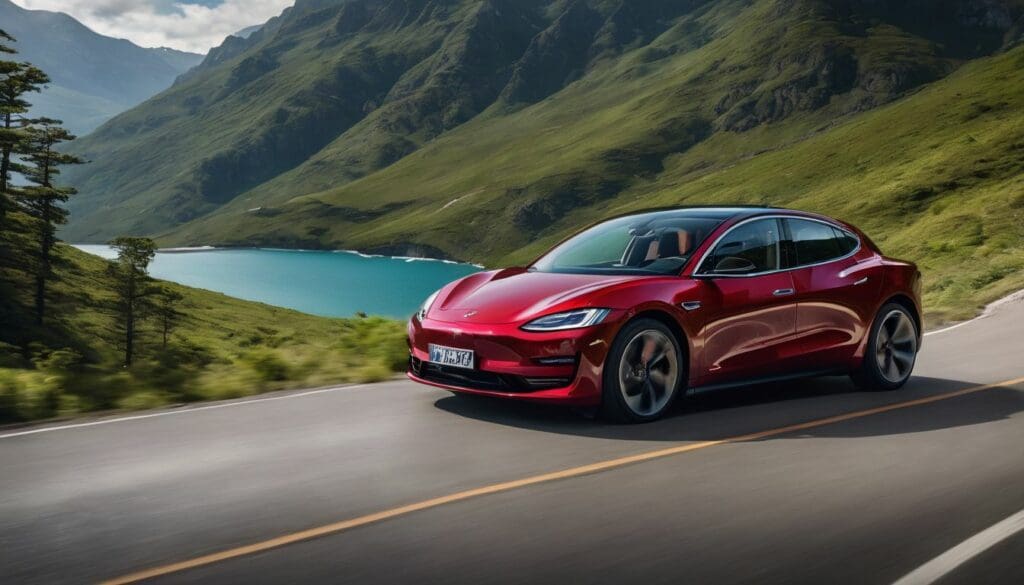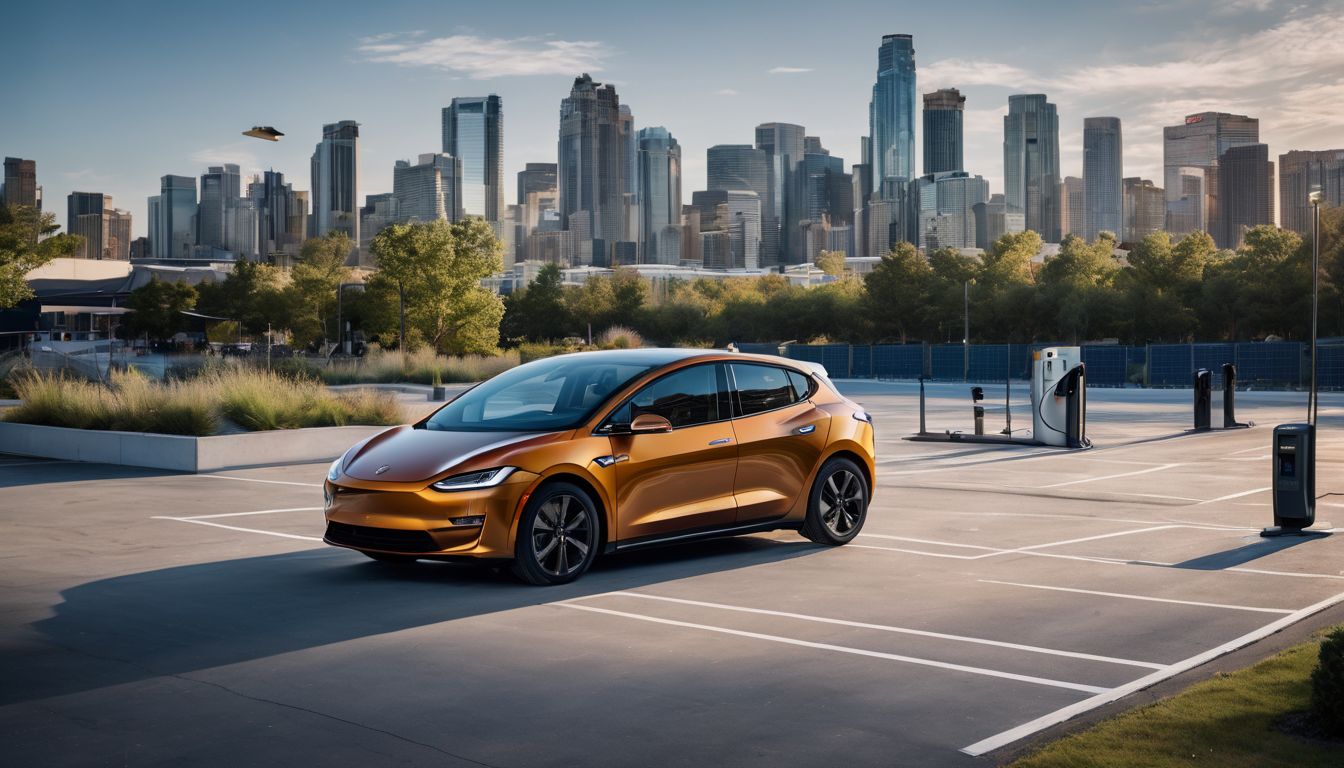We all recognise that creating a cleaner, healthier world is intimately linked with the choices we make in our daily commutes and travels. Just like you, we’re deeply invested in our planet’s future and are keenly aware of the pivotal role electric vehicles play within it.
It’s rather startling when one considers that nearly a quarter of global CO2 emissions are attributed to transportation.
Our insights promise to offer a guiding hand through the exciting landscape of electric vehicles – illuminating both their glowing potential and acknowledging the hurdles on the path to sustainable mobility.
By choosing to go electric, you’re not just selecting a new mode of transport; you’re embracing an opportunity to be at the wheel of change, propelling us towards brighter horizons for our shared home on Earth.
Key Takeaways
- Electric vehicles significantly cut down on emissions, which directly contributes to less air pollution and a reduction in carbon gases responsible for climate change. By choosing electric cars, buses or trains powered by clean energy, individuals play an active role in the global shift towards sustainable transportation.
- The sustainability of electric vehicles also depends on addressing challenges such as the need for ethical mining practices to source necessary minerals like lithium and cobalt, efficient use of materials to prevent waste, improvements in vehicle efficiency and recycling used batteries to recover valuable materials.
- To maximise the potential of electric vehicles for a greener future, enhancing public transport systems is vital. Making cities more walkable and bike-friendly further encourages this shift. It’s not just about individual EVs; it’s also about developing an overall infrastructure that supports low-carbon mobility options.
- Innovations in battery technology and vehicle design are continuously improving electric vehicle efficiency. These advancements help extend driving ranges and reduce energy consumption making them increasingly viable alternatives for more consumers.
- Recycling plays an integral part in ensuring the long – term sustainability of EVs by conserving natural resources through recovering minerals from spent batteries. This circular approach promotes a reduction in raw material demand, minimising additional mining activities.
The Rise of Electric Vehicles
Electric vehicles are becoming increasingly popular due to their benefits for the environment, including a reduction in carbon emissions and potential for sustainable transportation.
As the demand for EVs grows, it’s crucial to explore how they can contribute to a cleaner and healthier world.
Benefits for the environment
Switching to electric vehicles (EVs) massively slashes harmful emissions that contribute to air pollution. We witness a decrease in greenhouse gases each time someone opts for an EV over a petrol or diesel car, paving the way towards decarbonising transportation.
With every charge drawing from cleaner energy sources, we move closer to a vision of green transportation and sustainable urban planning.
We embrace renewable energy by powering our cars with wind, solar, and hydroelectric power rather than burning fossil fuels. This shift cuts down on smog and makes our cities more liveable.
By pushing forward with electric vehicle infrastructure and zero-emission policies, we’re not only choosing clean transportation but also nurturing a healthier environment for all species sharing our planet.
Reduction in carbon emissions
Transitioning from the benefits for the environment, a significant advantage of electric vehicles is their reduction in carbon emissions. By switching to electric cars and transportation options like buses and trains powered by clean energy sources, we can significantly decrease harmful greenhouse gases released into the atmosphere.
This shift towards zero-emission vehicles plays a vital role in decarbonising mobility and combatting air pollution, contributing to a greener future for all. With the potential for widespread adoption of electric vehicles, we have an opportunity to make substantial strides towards sustainable transportation and reduce our environmental impact.
The increasing use of electric cars not only supports conservation efforts but also aligns with the global push towards alternative fuels and clean energy initiatives. As environmentally conscious individuals, it’s essential that we embrace this evolution in vehicle efficiency to create an impactful change in reducing carbon emissions while driving towards a cleaner and more sustainable future.
Potential for sustainable transportation
Electric vehicles have the potential to revolutionise sustainable transportation. By reducing carbon emissions and air pollution, electric vehicles contribute to a cleaner environment.
The shift towards electric transportation policies and green vehicles is crucial for our planet’s future.
Furthermore, the evolution of electric cars and the increased emphasis on zero-emission vehicles align with the global transition towards sustainable transportation. Supporting these efforts means actively contributing to air pollution reduction and promoting efficient use of resources for environmentally conscious individuals.
Challenges of Electric Vehicles in Sustainability
Mining for necessary materials, like lithium and cobalt, often does not adhere to equitable practices. Additionally, efficient use of these materials is essential, along with the improvement of vehicle efficiency and the importance of recycling and recovering minerals for a sustainable future.
Need for equitable practices in mining
Equitable practices in mining are crucial for ensuring a sustainable supply chain of minerals essential for electric vehicle production. Responsible sourcing is necessary to minimise the environmental and social impacts of mining activities, safeguarding local communities and ecosystems.
Supporting ethical mining practices promotes fair labour conditions, reduces exploitation, and ensures that the extraction process aligns with environmental conservation efforts.
Prioritising equitable practices in mining contributes to reducing the negative ecological effects associated with mineral extraction for electric vehicle batteries. By advocating for transparent and responsible sourcing methods, we can help create a more environmentally friendly supply chain while also promoting social justice within mining communities.
Efficient use of materials
To ensure the sustainability of electric vehicles, efficient use of materials is crucial. Optimising the use of raw materials in vehicle manufacturing reduces waste and minimises environmental impact.
Implementing lightweight and durable materials helps increase energy efficiency, extending the lifespan of electric vehicles.
Optimising resource usage allows for a more sustainable production process while preserving valuable natural resources such as minerals. By sourcing and using materials responsibly, we can support the long-term viability of electric vehicles and contribute to a cleaner environment for future generations.
Improving vehicle efficiency
To enhance sustainability, improving vehicle efficiency is essential. Electric vehicles EVs are being designed with optimised battery technology and aerodynamics to extend driving range.
Streamlining the manufacturing process also reduces production energy, making electric car evolution more eco-friendly.
Furthermore, increasing research in lightweight materials contributes to the shift towards sustainable transportation by enhancing fuel efficiency and lessening environmental impact.
Importance of recycling
Recycling plays a crucial role in promoting sustainability by reducing the demand for raw materials and minimising environmental impact. By recycling minerals used in electric vehicle batteries, we can mitigate the need for extensive mining, ultimately preserving natural resources and ecosystems.
It’s important to actively support recycling efforts to ensure that essential elements like lithium, cobalt, and nickel are repurposed efficiently, underpinning the long-term viability of electric vehicles as a sustainable transportation solution.
Solutions for a Sustainable Electric Vehicle Future
Improving public transportation infrastructure and promoting walkability and bikeability are essential steps towards a sustainable future with electric vehicles. Implementing vehicle efficiency measures and investing in recycling and recovering minerals will also contribute to a more environmentally-friendly transportation system.
Increasing public transportation
- Expanding the coverage and frequency of bus and train services to make them more accessible and convenient for everyone.
- Implementing policies that prioritise public transit, such as dedicated bus lanes and improved infrastructure for cyclists.
- Encouraging the use of shared mobility services like ride-sharing and carpooling to reduce the number of individual vehicles on the road.
- Investing in clean energy technologies to power public transport, such as electric buses and trains.
- Educating communities about the benefits of using public transport to reduce their reliance on personal vehicles and lower overall carbon emissions.
Improving walkability and bikeability
- Creating dedicated cycling lanes to ensure safety and convenience for cyclists.
- Designing pedestrian – friendly urban spaces that prioritise walking and make it more accessible.
- Implementing bike – sharing programmes to encourage the use of bicycles for short trips.
- Investing in infrastructure that supports active transportation, such as bike racks and secure parking facilities.
- Promoting awareness and education on the benefits of walking and cycling for both individuals and the environment.
Vehicle efficiency measures
To further mitigate our environmental impact, we can also improve the efficiency of electric vehicles. Here are several ways to achieve this:
- Optimising battery technology: Advancements in battery technology can increase energy storage capacity and reduce charging time, making electric vehicles more efficient and practical for longer trips.
- Enhancing aerodynamics: Streamlining the design of electric vehicles reduces air resistance, improving their overall efficiency and extending their battery range.
- Implementing regenerative braking systems: This innovative technology captures and stores kinetic energy when a vehicle brakes, effectively increasing its efficiency by reusing energy that would otherwise be lost.
- Utilising lightweight materials: Introducing lightweight materials such as carbon fibre or aluminium alloys can reduce the overall weight of electric vehicles, thus enhancing their energy efficiency without compromising safety.
- Upgrading power electronics: Enhanced power electronics systems can optimise the delivery of electricity to the vehicle’s components, resulting in increased efficiency and reduced energy wastage.
Recycling and recovering minerals
Recycling and recovering minerals significantly reduces the need for new mining, lessening environmental impact. Minerals like lithium, cobalt, and nickel can be recycled and repurposed to create new batteries.
- Repurposing lithium – ion batteries helps reduce the demand for mining new resources.
- Recovering cobalt from used batteries supports sustainable resource management.
- Recycling nickel allows for the creation of new batteries without increasing environmental strain.
- Reusing materials promotes a circular economy, reducing waste and conserving resources.
Conclusion: Driving Towards a Sustainable Future with Electric Vehicles
Embracing electric vehicles offers a significant opportunity for sustainable transportation. We can reduce our carbon footprint and strive towards a cleaner environment. By addressing the challenges and implementing solutions, we pave the way for an eco-friendly future.
Together, we can drive positive change and build a more sustainable world with electric vehicles at its core.
FAQs
1. What role will electric vehicles play in sustainable transport?
Electric vehicles are set to become a major part of sustainable transport as they reduce emissions and contribute to cleaner air.
2. Are all electric vehicles zero-emission?
Yes, by design, electric vehicles are zero-emission since they do not burn fuel or release exhaust gases.
3. Will the future of transport rely solely on electric vehicles for sustainability?
While the future trend leans heavily towards electric vehicles for their environmental benefits, ongoing developments in other technologies also enhance sustainable transport systems.
4. How can driving an electric vehicle help our environment?
Driving an electric vehicle helps protect our environment by cutting down on harmful pollutants that contribute to climate change and degrade air quality.





